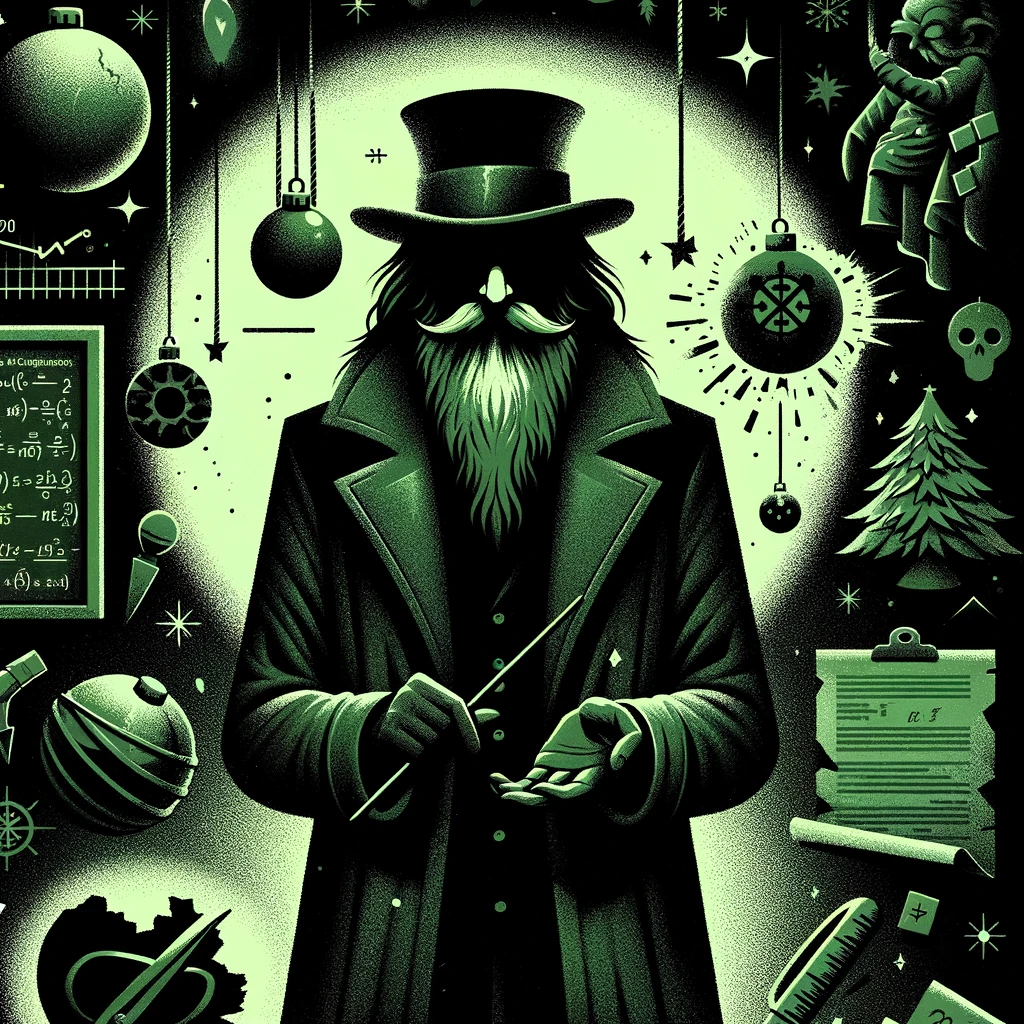So, why do academics hate Christmas? Academics hate Christmas, but like everything else in academia they can’t agree on why… they each have their own disciplinary reasons, here are some examples…
Theology academics hate Christmas and absolutely detest how Christmas’s commercialization overshadows its spiritual roots. They firmly believe the holiday has deviated from its theological origins, turning a sacred religious festival into a shopping spree. They grumble at the sight of Christmas trees, yearning for more profound spiritual reflection.
Ancient Language academics hate Christmas and have a well-known aversion to Christmas, primarily due to the rampant mispronunciation of historical texts and carols. They cringe at the sound of Latin carols butchered by amateur choirs and are known to correct the grammar on Christmas cards written in ancient languages.
Physics academics hate Christmas and reject the physics-defying concept of Santa Claus. They have calculated the impossibility of a sleigh flying at the speed needed to deliver presents worldwide in one night and dismiss any magical explanations as unscientific.
Mathematics academics hate Christmas and find the “Twelve Days of Christmas” mathematically infuriating. They are known to lecture on the illogical accumulation of gifts and the nonsensical nature of receiving an increasing number of birds and performers.
Psychology academics hate Christmas and are critical of the psychological impact of Christmas. They point to the stress and unrealistic expectations surrounding the holiday and are particularly skeptical of the effect of the ‘naughty or nice’ concept on child development.
Economics academics hate Christmas and view it as a glaring example of economic irrationality. They scorn the inefficiency of gift-giving and the wastefulness of holiday spending, advocating for a more utilitarian approach to year-end festivities.
Literature Professors academics hate Christmas and lament the lack of literary depth in Christmas stories. They criticize the simplistic narratives and flat characters typical of holiday tales, longing for more complex and thought-provoking Christmas literature.
Computer Science academics hate Christmas and are exasperated by the unrealistic portrayal of technology in Christmas movies. They are particularly irked by scenes of miraculous hacking to save the holidays and roll their eyes at the sight of overly complex Christmas light displays.
History academics hate Christmas and are frustrated by the historical inaccuracies rampant in Christmas celebrations. They scoff at the anachronisms in holiday movies and are known to give impromptu lectures on the true origins of Christmas traditions.
Biology academics hate Christmas and are dismayed by the ecological impact of Christmas. They decry the cutting down of trees and the depiction of reindeer biology in holiday lore, often giving lectures on the environmental footprint of the festive season.
Sociology academics hate Christmas and view it with hypercritical critical eyes, seeing it as a period of intensified social stratification and consumerism. They are known to grumble about the holiday’s reinforcement of societal norms and the pressure it puts on family dynamics, often turning Christmas dinners into impromptu lectures on social structures.
Anthropology academics hate Christmas and take issue with the homogenization of cultural practices during Christmas. They bemoan the overshadowing of diverse winter solstice traditions by a dominant Christmas narrative and are often found critiquing the cultural appropriation in modern Santa Claus depictions.
Political Science academics hate Christmas and see it as a hotbed of political symbolism and power dynamics. They cynically analyze the holiday’s role in national identity and international relations, often remarking on the politicization of Christmas messages and the use of the holiday in political campaigning.
Economic academics hate Christmas and are particularly scornful of the “Christmas bonus” phenomenon, seeing it as a poorly optimized incentive system. They often argue that the holiday season distorts market behaviours and leads to inefficient labour practices.
Civil Engineers express frustration over the logistical nightmares caused by Christmas decorations in public spaces. They criticize the disruption of traffic patterns and pedestrian flow due to holiday markets and parades, often proposing more efficient designs for festive city planning.
Mechanical Engineers have a bone to pick with the impractical design of Christmas toys. They disdain the lack of durability and engineering precision in children’s toys, lamenting the missed opportunities for educational and mechanically sound playthings.
Electrical Engineers are known to scoff at the inefficiency of Christmas lighting. They decry the energy waste and often give unsolicited advice on the optimal wiring and power consumption of holiday light displays.
Environmental Engineers view Christmas with concern for its environmental impact. They criticize the holiday’s contribution to waste and pollution, from wrapping paper to electronic waste post-holiday, and are vocal advocates for sustainable celebration practices.
Psychiatrists are wary of the mental health implications of Christmas. They point to the rise in stress and anxiety during the holiday season, often suggesting that the societal pressure to be joyful and social can have adverse effects on mental well-being.
Computer Engineers are irritated by the simplistic portrayal of technology in Christmas gadgets and movies. They deride the unrealistic expectations set by high-tech Christmas gifts and the portrayal of AI and robotics in holiday-themed tech commercials.


